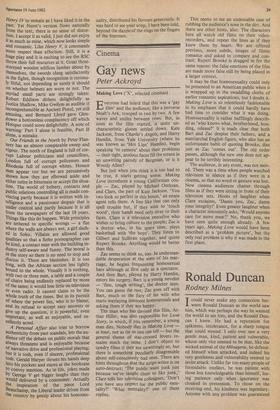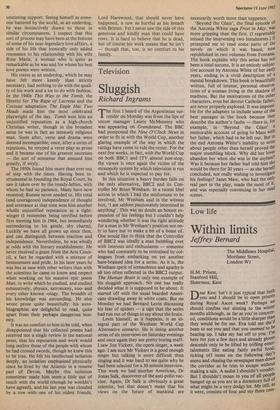Ronald Duncan
Rodney Milnes Icould never make any connection bet- ween Ronald Duncan as the world saw him, which was perhaps the way he wanted the world to see him, and the Ronald Dun- can I knew. He had a reputation for spikiness, intolerance, for a sharp tongue that could wound. I only ever saw a very gentle man, kind, patient and vulnerable, whose only vice seemed to be that, like the wicked animal of the Menagerie, he defend- ed himself when attacked, and indeed his very gentleness and vulnerability seemed to invite attack. Unlike far too many people of formidable intellect, he was patient with those less knowledgeable than himself, los- ing patience only when ignorance was cloaked in pretension. To those on the receiving end, his kindness was legendary. Anyone with any problem was guaranteed
unstinting support. Seeing himself as some- one battered by the world, as an underdog, he was instinctively drawn to those in similar circumstances. I suspect that this sort of process may have been at the bottom of some of his near-legendary love affairs, a side of his life that ironically only added resonance to his relationship with his wife Rose Marie, a woman who is quite as remarkable as he was and for whom his best love poems were written.
His status as an underdog, which he may have felt more keenly than strictly necessary, had nothing to do with the quali- ty of his work and a lot to do with fashion. In the 1940s This Way to the Tomb, the libretto for The Rape of Lucretia and the Cocteau adaptation The Eagle Has Two Heads made him the most celebrated playwright of the day. Tomb won him an unjustified reputation as a high-church Christian writer, though in the broadest sense he was in fact an intensely religious man. Soon after, verse and drama were deemed incompatible; once, after a series of rejections, he retyped a verse play as prose and it became one of his greatest successes — the sort of nonsense that amused him greatly, if wryly.
The 1950s found him more than ever out of step with the times. Having been in- strumental in founding the Royal Court, he saw it taken over by the trendy-lefties, with whom he had no patience. Many have now recanted; Ronnie never needed to. His total (and courageous) independence of thought and utterance at that time won him another wholly unjustified reputation as a right- winger (I remember being terrified before first meeting him in 1964, but immediately surrendering to his gentle, shy charm). Luckily we have all grown up since then, and can distinguish between reaction and independence. Nevertheless, he was wholly at odds with the literary establishment. He never received a grant from the Arts Coun- cil, a fact he regarded with a mixture of bemusement and pride. In his later years he was less at ease with other writers than with the scientists he came to know and respect when working on his massive epic poem Man, to write which he studied, and studied exhaustively, physics, astronomy, zoo- and every other known -ology. The breadth of his knowledge was astounding. He also wrote prose quite beautifully: his auto- biographies are delightful to read, quite apart from their perhaps dangerous hon- esty.
It was no comfort to him to be told, when disappointed that his collected poems had received not a single review in the national press, that his reputation and work would long outlive those of the people with whom he had crossed swords, though he knew this to be true. He felt his intellectual isolation deeply, an isolation emphasised physically since he lived by the Atlantic in a remote part of Devon. Maybe this isolation sometimes made him seem a little out of touch with the world (though he wouldn't have agreed), and his last year was clouded by a row with one of his oldest friends, Lord Harewood, that should never have happened, a row as hurtful as his breach with Britten. Yet I never saw the side of this generous and kindly man that could have rows. It is hard to believe that he is dead, but of course his work means that he isn't — though that, too, is no comfort to his family.





































 Previous page
Previous page